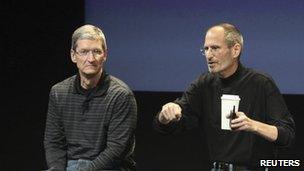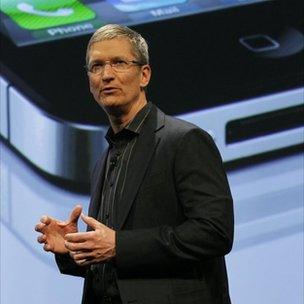Profile: Apple's Tim Cook
- Published

Tim Cook has always been overshadowed by his high-profile boss
The news that Apple chief Steve Jobs is standing down as CEO of the firm he is inextricably linked with turns the spotlight on his successor, Tim Cook.
As the company's chief operating officer, Mr Cook has been a senior figure at Apple for more than a decade.
Yet he remains largely unknown by the public, overshadowed by his high-profile boss.
So who exactly is the 50-year-old who has his hands on one of the world's most powerful companies?
With a quiet demeanour and soft Southern accent, it would be easy to imagine that Mr Cook was merely a bit-part player in Apple's return to success over the past decade. In fact, his expertise in logistics and operations has been credited as one of the crucial elements that has allowed the company to soar on the back of the iPhone and iPod.
Notorious for being a hard worker who sleeps little, Mr Cook oversees day-to-day operations with a focus and dedication that insiders say is almost unparalleled.
'Workaholic'
Mr Cook is an industry veteran who spent more than a decade with IBM, before he was lured by Mr Jobs to join Apple in the late 1990s. Given the task of turning around the fortunes of the company, which was on the brink of collapse at the time, he made some drastic - and highly effective - decisions.

Is Tim Cook the natural successor to Steve Jobs?
Under Mr Cook's direction, Apple closed down most of its manufacturing operations and recast itself as a lean and flexible operation.
He forged close links with Asian companies who build the hardware, cutting costs and pushing technical boundaries, and supported the move to concentrate sales efforts on a string of high-end retail outlets, which Mr Jobs initially opposed.
Mr Cook, a fitness fanatic and outdoor enthusiast, is said to be a great believer in intuitive decisions: it is this knack for doing the right thing that has won him the trust of Mr Jobs and Apple's board of directors.
Indeed, he has already spent three spells holding the reins while Mr Jobs has stepped aside.
He was given the top job temporarily in 2004, when the Apple co-founder first underwent treatment for pancreatic cancer, and then took over again in 2009 when Mr Jobs took time off to receive a liver transplant.
In January 2011 he once again took over as stand-in as Mr Jobs chose to focus on his health.
And he has been well compensated for his efforts, last year alone earning a salary of $800,000 (£500,000), a bonus of $5m (£3.1m) and stock options worth more than $50m (£31m).
It is a surprising trajectory for a man born in 1960 to a working class family in the Gulf coast town of Robertsdale, Alabama. His father was employed around the local shipyards and, after graduating high school, Mr Cook headed for an industrial engineering degree at Alabama's Auburn University.
Though Auburn was also the alma mater of Wikipedia co-founder Jimmy Wales, it is more famous for its sporting heritage than breeding hi-tech business acumen, and Mr Cook continued his studies with an MBA at Duke in North Carolina.
After graduating he spent more than a decade working his way up the ladder at IBM before changing and eventually being lured by Mr Jobs to join Apple in 1998.
More than 12 years later, he appears as dedicated to the company now as he was then: even his own father has called him a workaholic.
Whether or not he would inherit the leadership of Apple in the long run was never clear, until the moment that he did.
But as the man credited with turning Steve Jobs' vision into hit products, he is certainly more than just a safe pair of hands.
- Published18 January 2011
- Published17 January 2011
- Published17 January 2011
- Published18 January 2011